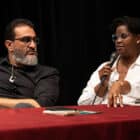English
Vulnerable and Racialized Communities Are Most Affected by Climate Crisis
|
“The issue of climate change is intersected by capitalism, colonialism and racism.” Gloriann Sacha Antonetty Lebrón, founder and editor of Revista étnica, said during her participation in the panel “Intersections of poverty, race, gender and climate crisis,” as part of the lineup of activities during the Caribe Fest event that took place May 4-6 in Old San Juan. Antonetty Lebrón sat with Roberto Thomas, coordinator of the Jobos Bay Eco Development Initiative (Idebajo, in Spanish), at the panel moderated by Center for Investigative Journalism (CPI, in Spanish) journalists José Encarnación and Cristina del Mar Quiles — also co-founder of the feminist journalism media outlet Todas. They explained that there is an intersection between the climate crisis and poverty, people of color and gender, which is observed, for example, in the displacement events of vulnerable communities in Puerto Rico. Antonetty Lebrón evoked the historical aspect of racism and enslaved people to show the experiences that vulnerable communities have experienced along Puerto Rico’s southern region, the historic population of Calle Loiza in Santurce, -a San Juan neighborhood- as well as residents of the island municipalities of Vieques and Culebra. “Racism, trafficking, slavery… what it did was dehumanize us and give reason to exploit us; break our spirit, exploit our lands, force us to work the land and, once we get to enjoy the natural resources a bit, we know that they are resources that are constantly under threat: they plunder them, they displace us,” the editor of Revista Étnica said.



